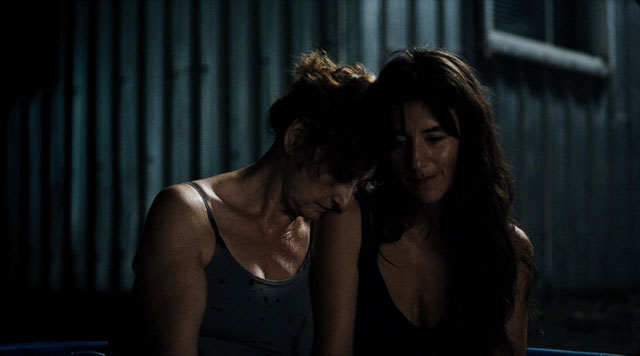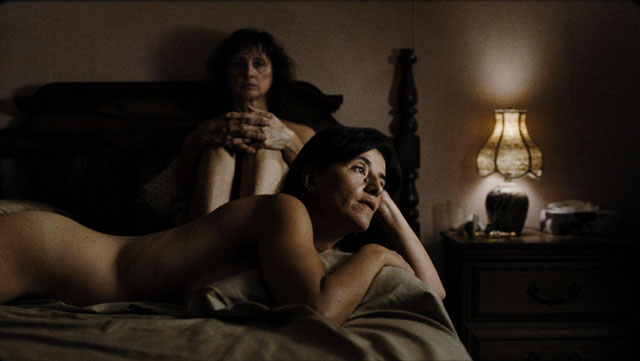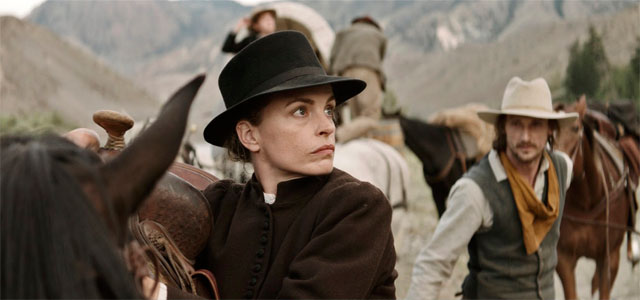Hard to believe that it was just a year ago that Denis Côté premiered one of my favorite films of 2012 here in Berlin, Bestiaire. While it’s ridiculously early in the year to make predictions about such things, I wouldn’t be surprised to find Vic+Flo Saw a Bear on my 2013 list. What I can certainly say now is that it’s my favorite film in Competition at the Berlinale so far. Today, I ran into MUBI’s Adam Cook and was pleasantly surprised (considering how low so many other critics are rating it) to find that he’s just as enthusiastic about this one as I am. Today in the Notebook, he’s written: “Deceptively quaint is Vic+Flo’s narrative, not so much more dressed up than his last fiction film, Curling. Rather, it’s in Côté’s fluency with his extensive cinematic vocabulary, and the rhythmic succession of images he assembles, that a direction beyond the film’s minimal, unassuming plot is foreshadowed.”
Vic and Flo (Pierrette Robitaille and Romane Bohringer, both outstanding; in general, this year’s Berlinale is showcasing a superabundance of great performances by actresses) are ex-cons making a go of starting fresh and straight in a house (little more than a shack, really) in the Canadian countryside. They verbally rough up Vic’s parole officer, Guillaume (Marc-André Grondin, sweet), but eventually come to see him as a handy confidant. But it’s in the cluster of second-tier characters that you begin to catch initial hints of the game Côté is playing here.
The name Wes Anderson’s been dropped in the trades, as well as in a few conversations on Potsdamer Platz, and I might see a faint similarity in the starkness of the two filmmakers’ compositions, but it’d end there. Overall, Côté’s language is far more fluid (though he’s also not one to shy away from jolting cuts—why are we looking at a flock of bicyclists? why suddenly this angry face with its bulging eyeballs?), slyly shifting the viewer’s perception of what’s actually going down within or between scenes. Côté toys with sympathies, pulling the rug out from under us every few beats—and then there’s the ending, which threw me for a loop and lost several other viewers altogether. Reflecting later on the back stories of Vic and Flo, I eventually came to terms with it. “It’s over,” whispers Flo.
More from Eric Kohn (Indiewire), Lee Marshall (Screen), David Rooney (Hollywood Reporter), and Boyd van Hoeij (Variety).
Updates, 2/13: “The sumptuous 35mm cinematography is as gritty as its subject matter and Côté displays a very keen eye for mise-en-scène, constructing unobtrusive yet carefully composed shots that inject beauty even in the bleakest of scenarios,” writes Giovanni Marchini Camia, dispatching to Film Comment. “The film’s greatest accomplishment, however, is its characterizations. Equal credit goes to Côté’s writing and to the performances of Pierrette Robitaille (mostly known for light-hearted comedies) and Romane Bohringer as Vic and Flo for realizing such complex and convincing characters, imbuing these women with depth and humanity that fully invests us in their relationship regardless of how dislikeable and unappealing they may be on the surface. Their fate’s vertiginous downward spiral ensnares the viewer, leading to an extraordinary dialectic finale that leaves one traumatized, uplifted and utterly breathless.”
“Crippled by its focus on small-town quirk, the film plays like an unfunny Fargo directed by Jared Hess,” finds Joseph Pomp at the House Next Door.
More, in Spanish, from Diego Lerer.
Updates, 2/16: The Voice‘s Scott Foundas notes that “gradually, Vic+Flo Saw a Bear takes on the air of a dark fairy tale with touches of the absurd—a shift in tone that might have seemed ridiculous, but which Côté deploys so effortlessly that we gladly follow, over the river and through the woods to a place where the brothers Grimm and the brothers Coen seem to collide.”
Shane Danielsen, dispatching to Sight & Sound, notes “just how cruelly unforgiving the digital revolution has been on our performers. Whatever a valentine to actors might constitute these days, this film—shot in a desaturated, ultra high-contrast hi-def—was its opposite: glaringly exposing every detail (and therefore, every flaw) in the features of leads Marie Brassard and Romane Bohringer, rendering every wrinkle, every line, as if it were etched in charcoal, across skin the color of old newspapers.”
For Twitch‘s Brian Clark, Vic+Flo “might have been the daring, offbeat discovery of the year. As it stands, it’s more of an overly-self conscious, though occasionally inspired, oddity.” More from Christopher Shea (Phoenix).
For a few years now, followers of the Berliner Schule have been ruminating on the uses many of its “graduates” have made of genre in relatively recent work, but for the most part, the range of the actual genres they’ve turned to up to now has been tight and narrow: noir, gangsters, and the like. With Gold, Thomas Arslan presents a straight-up western, the tall tale of an expedition of German immigrants setting out in 1898 from British Columbia for the goldfields of the Yukon Territory.
Frankly, I’ve had a hard time separating the ways Gold resonates with me personally from the ways I ought to be looking at it objectively. Much of my adult life has been spent in Germany, looking at the country and its people through American eyes; further, much of my youth was spent in Texas, a state seeped to the bone in pioneer lore. To see these Germans in their Karl May costumes and to hear them discuss coping with the rugged land and being overwhelmed (eventually quite literally) by the sheer vastness of the North American continent just sounds all sorts of chords—for me.
Nevertheless, I can still judge the dialogue of the few English-speakers heard early on to be stilted (many German directors, I’m afraid, seem over-confident in their ability to measure the authenticity of the English their actors give them), and I can still cringe at the clunkiness overall of the first hour or so. But I do think that, as the expedition thins out, as expeditions in westerns are wont to do, and Arslan can focus on a tighter dynamic between fewer characters, Gold finds its footing (and let’s note, too, that Gold was shot chronologically; the cast and crew do seem to have found, grown into, and filled out the world they initially set out to create).
At any rate, all the classic tropes of the western are eventually stroked with what seems to me genuine love and respect, so that, once the credits rolled, I told a friend, “When I go, I want to be shot in the back by Nina Hoss.” Not true at all, but in the moment, it felt right somehow.
More from Mark Adams (Screen), Eric Kohn (Indiewire), Bénédicte Prot (Cineuropa), Alissa Simon (Variety), and Deborah Young (Hollywood Reporter). Brian Brooks has notes from the press conference. Film Zeit is collecting reviews in German.
Updates, 2/13: At the House Next Door, Joseph Pomp mentions the elephant in the room, Kelly Reichardt‘s Meek’s Cutoff: “Despite the two films’ comparable revision of the genre, Gold evades the lugubrious tone of Reichardt’s film with a twangy guitar score by Dylan Carlson in a similar vein to Neil Young’s for Dead Man. (It’s likely that Arslan had Jim Jarmusch in mind, as Carlson’s drone band, Earth, contributed a track to The Limits of Control.)”
Writing for Time Out New York, Stephen Garrett finds that Gold “drifts aimlessly due to a mediocre supporting cast spouting hackneyed dialogue, plus a predictable screenplay and some deeply uninspired direction.”
And for Giovanni Marchini Camia at Film Comment, Gold is “so terrible it almost legitimizes accusations of programmer bias towards German productions.”
More from Diego Lerer (in Spanish).
Update, 2/19: For the New York Times, Dennis Lim interviews Nina Hoss, “who will next be seen opposite Philip Seymour Hoffman in Anton Corbijn’s adaptation of John le Carré’s novel A Most Wanted Man.” They discuss Gold and her collaborations with Arslan and Christian Petzold.
For news and tips throughout the day every day, follow @KeyframeDaily on Twitter and/or the RSS feed. Get Keyframe Daily in your inbox by signing in at fandor.com/daily.







